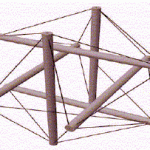2005
Aron Pease introduces this collection of essays by Linda Brigham, Caren Irr, William Wilson and Nick Spencer with a look at the multitude's programmability.
Chris Stroffolino responds to Lori Emerson
"Playing with play," John Cayley sets ludology on an even playing field with literature, but without literary scholarship's over-reliance on 'story,' 'closure,' and 'pleasure.'
The reader steps to the fore in the final section of First Person, reconfigured and ready for interaction.
Reading subjectivity into the software interface, N. Katherine Hayles offers a compelling case for computational authorship.
Which alias best fits interactive fiction? The nominees are: "Story," "Game," "Storygame," "Novel," "World," "Literature," "Puzzle," "Problem," "Riddle," and "Machine." Read, and decide.
Tim Keane on rock'n'roll awakenings and the lyrical existentialism of U2 (St Patrick's Day Special, 2005)
The subject of conversation enters the conversation that is First Person, here in section seven.
"Collaboration shifts": Victoria Vesna investigates the digital/physical limn, the compression of spacetime, and the condition of tensegrity in projects such as n0time and Datamining Bodies.
Cris Mazza on hijacking the terms of postfeminism.
A Wallace Stevens conference review from poet and critic Ravi Shankar.
David Nobes on the World Summit on the Information Society and the failure of some of its visionaries to see beyond tame and regimented applications of the Internet.
From origin stories to progressive science fiction, Lisa Yaszek studies the changing face of feminsim.
geniwate writes along with sexless software agents and dismantles the gender politics of the programming man and his machine.
Elyce Helford frames Tank Girl as a portrait of the postfeminist woman: hyper-individualist and hyper-sexual - a woman who is quite comfortable in popular cinema but not so much so in reality.
2004
Diana Lobb responds to Katherine Hayles and ponders the ambiguities of dialogue.
William Major measures academic "ecocriticism" against the practical "agrarianism" of Wendell Berry.
Diana Lobb tackles the legacy of positivism and the politics of chaotics.
